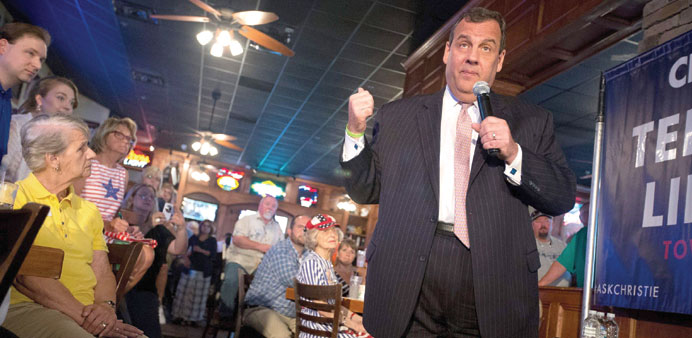Republican presidential candidate New Jersey Governor Chris Christie speaks to guests gathered for a campaign event at Jersey Grille on Friday in Davenport, Iowa. A recent poll had Christie trailing most of his Republican rivals in Iowa.
Tribune News Service/Trenton, New Jersey
When New Jersey Gov. Chris Christie recently launched his presidential bid with a rally at his old high school, Jim O’Neill pointedly skipped the homecoming event.
“I didn’t want to do anything that would have suggested, even tacitly, that I was supportive of him or his policies,” said O’Neill, the school district’s interim superintendent.
Christie and O’Neill once feuded over superintendent salaries, so the two have a history. But many share O’Neill’s harsh assessment of the state’s two-term governor.
Even as Christie travels the country in pursuit of the GOP nomination, his approval rating in New Jersey has plunged, to the woeful 30% range. “There’s a growing sense among New Jerseyans this guy is simply not on the job, and we’re seeing a state that is stagnating because of it,” said Patrick Murray, who directs polling at New Jersey’s Monmouth University.
Christie is not the only governor with eyes on the White House who faces trouble back home.
Wisconsin’s Scott Walker, one of the top contenders for the Republican nomination, also gets disapproving marks from a majority of constituents, as does Louisiana’s Bobby Jindal, which raises an obvious question: Why should they be elected president if those who know them best aren’t pleased with their performance?
The governors speak of the tough decisions they’ve had to make as their state’s chief executive - a contrast, they say, with the many US senators, past and present, who are running for president and have never done anything but debate and vote on legislation.
“I would be bored to death,” Christie once said of life in the Senate. “Can you imagine me banging around that chamber with 99 other people? Asking for a motion on the amendment in the subcommittee? Forget it.”
For Christie and Walker, though, the discontent threatens to undercut a key rationale for their presidential campaigns, the argument that support in their Democratic-leaning states shows an ability to broaden the Republican Party’s appeal and, ultimately, win the White House.
The reasons for the governors’ sagging approval vary.
Jindal, who is focused on rallying the party’s conservative base, has alienated old allies in the business community and Louisiana’s GOP-run legislature by taking a hard right turn.
His refusal to consider tax hikes to close a $1.6bn deficit, which arose in good part from earlier tax cuts, is seen by critics as an attempt to bolster his political credentials at the expense of the state’s education and healthcare systems. A May poll gave Jindal a 32% approval rating.
In Wisconsin, the union-battling Walker has long been a polarising figure, admired by Republicans, loathed by Democrats and generally supported by independent voters. But of late he’s been seen more negatively than positively - the most recent Marquette University Law School poll pegged his approval at 41% - as Walker sparred with fellow GOP lawmakers over proposed cuts to education and health care and other steps to close a $2.2bn budget deficit.
His difficulties have been compounded by Wisconsin’s tepid economy, which lags others in the region. Walker said polls go up and down.
“When people see the benefits of the budget as opposed to just the media talking about the complaints locally, I think we’ll be back on track in the state as we have many times before,” Walker said on Fox News.
But of all the candidates running, none has fallen further, harder than Christie, who was once considered a front-runner for the GOP nomination but now is fighting to make the cut of 10 candidates allowed on stage next month for the first presidential debate.

